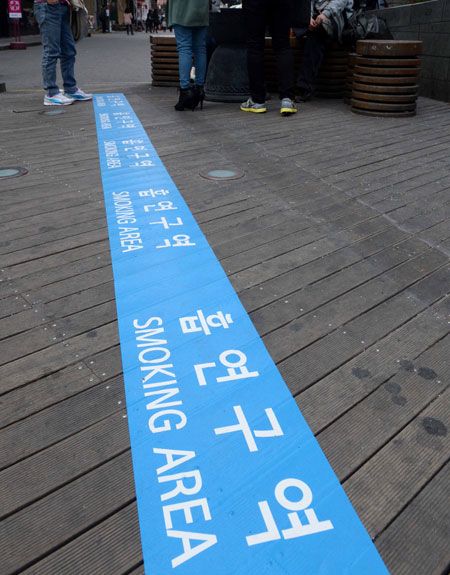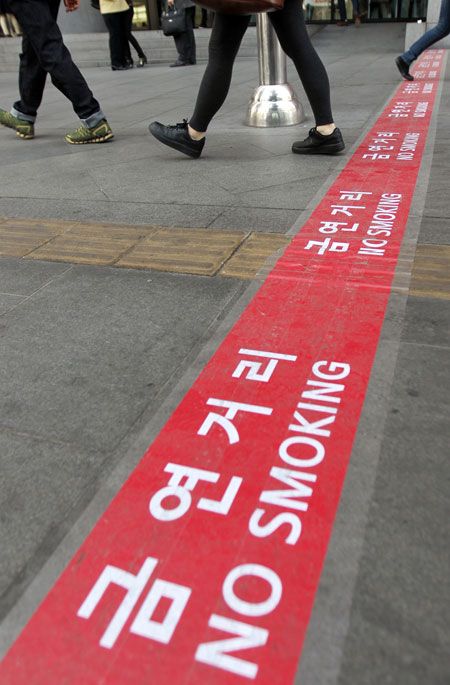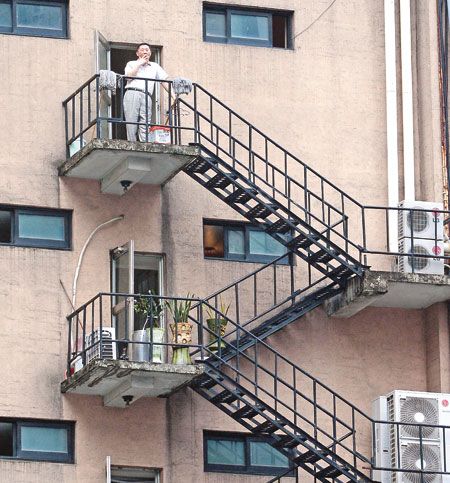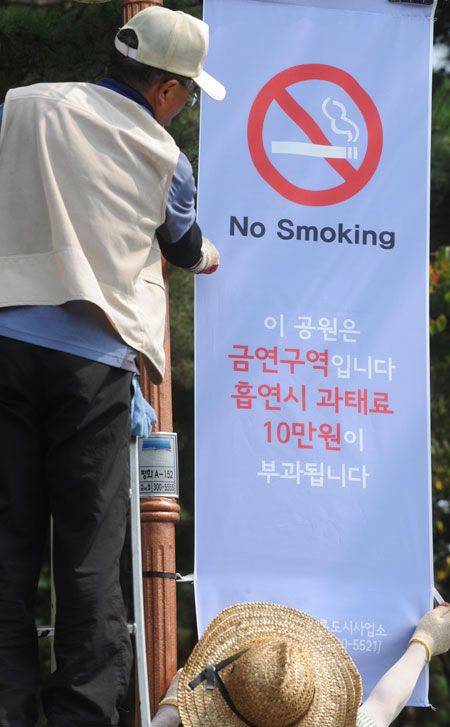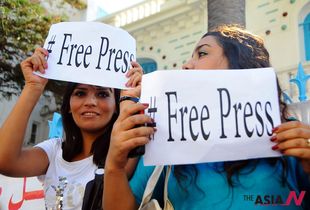“I can’t stand the smell of cigarette smoke when I step into the restroom in my office building. Some people smoke inside the booths, it’s really irritating,” says Kim Ga-eun, a 31-year-old sales manager.
Under the current People’s Health Promotion Law, buildings with floor space of over 2,000 square meters are obliged to ban smoking. However, many people ignore this law and sneak a smoke indoors, leaving non-smokers to endure the experience of passive smoking.
“The existing law is largely ineffective, so we need more practical regulations to protect passive smokers more effectively,” Kim said.
In response to complaints from passive smokers, the Ministry of Health and Welfare recently announced a revised anti-smoking law that will go into effect beginning Dec. 8. Under the revised law, smoking will be banned in all restaurants including bars and coffee shops with the floor space of over 150 square meters, with all restaurants and bars, regardless of their size, subject to the rule from 2015. Smokers who violate the law will face fines of up to 100,000 won.
Smokers, however, say that the new ban on smoking, including in bars where they drink, is too much for them.
“I’m fed up with people’s stare seemingly accusing me as if I’m a sort of a murderer whenever I smoke not only indoors but also outside,” says Song Min-chul, a 30-year-old real-estate consultant.
“So far, I can smoke relatively freely in bars and pubs when I drink a glass of beer with my friends. Once the revised law becomes effective next month, however, where should I go and smoke? I think it’s way too much,” says Song. “Why does the government keep adding new rules and at the same time allow the sale of cigarettes? Don’t you think there is something amiss in this situation?”
Anti-smoking campaign effective?
Signs denoting non-smoking areas are everywhere. With massive anti-smoking campaigns gaining momentum, the public perception about smoking is different from the past.
About 10 years ago, it was easy to find a cigarette hanging from a “tough” guy’s lower lip in TV dramas. It was a symbol of machismo back then.
Now, tough guys still appear on TV but without cigarettes. What used to be something “cool” has now been downgraded to a filthy habit that people are obliged to stop. Smokers, who picked up their first cigarette pack after being drawn by the “cool” image, have been left to take the blame for threatening public health.
A 27-year-old entrepreneur Lee Han-eol said the government deserves criticism, not the smokers.
“I don’t understand the smoke-free campaigns driven by the government because they do know how to reduce the smoking rate dramatically, if they really want,” Lee said. “For instance, cigarettes are very cheap here compared to in many other developed countries. Raising the tax rate on the product will be the most effective way to discourage people from smoking.”
Many studies have demonstrated that people with less money tend to buy more cigarettes than wealthier individuals. Thus, it surely will have an impact on reducing the number of smokers in this country, Lee said.
“For the past few years, tobacco product prices have remained almost the same, given the overall inflation rate. With that in mind, I wonder if the government really wants us to quit smoking,” Lee said. “Extending non-smoking areas is not an effective way to help people like me to stop smoking. Rather, it just irritates me. I mean, why sell them?”
Despite various anti-smoking campaigns led by the government, the smoking rate among male adults has never fallen below the 40 percent mark here.
Non-smokers say the law enforcement authorities must carry through anti-smoking regulations more stringently _ more actively imposing fines on those who violate the anti-smoking rules.
Non-smokers’ rights
“What I hate most is when somebody walking in front of me on a street is smoking,” said 26-year-old graduate student Lee Soo-jung. Lee explained that when this happens, she usually overtakes the person, to avoid the smoke.
“But sometimes when the street is too narrow, I don’t have a choice but to follow the person and breathe in all the smoke, and that is really annoying,” she said.
Lee said non-smokers’ rights should be prioritized. “After all, the Constitution says non-smoker’s rights are considered above smokers’ rights,” she said.
Not only should smoking be banned to protect non-smokers, but also for the health of smokers, said Lee.
She is doubtful about the effectiveness of the measures that the government is taking to curb smoking. “All it is essentially doing is limiting the spaces where people can smoke. That is not going to stop them from smoking,” she said, adding that they will always find some other place to smoke.
The government has laid out a set of measures to gradually ban smoking in public places such as bus stops, crowded streets and restaurants by 2016. It is also working on a plan to make highway rest areas and historic sites smoke-free.
“If the government is really set on having people quit smoking, it should take other measures such as raising the price of cigarettes,” Lee said.
The average price of a pack of cigarettes ranges is 2,500 won. In some European countries, the price is almost four to five times that of Korea. In Korean currency, the price in Ireland is 14,975 won and in the United Kingdom 11,525 won. Both countries have lower smoking rates than Korea.
Korea has the lowest price of cigarettes among 22 member states of the OECD, but ranks second in terms of worldwide smoking rates at 44.3 percent. It follows Greece which has a smoking rate of 46.3 percent.
But other non-smokers who also want their rights to be protected, say that on the other hand smokers’ basic right to smoke should be respected as long as it does not damage others.
“Although I believe non-smokers’ rights should be prioritized, that doesn’t mean I am against people smoking,” said Kim Won-june, a 24-year-old university student. “Smokers can smoke as long as they do not cause harm to non-smokers.”
Kim said non-smokers should be protected from second-hand smoke at public places, and that therefore he supports the government’s measures to expand public areas that are subject to the smoking ban.
However, he added that at the same time, the government should provide alternatives to smokers.
“For example, even if smoking is banned in public places, there should be spots where smokers are free to light up, such as the area in front of my school library where students can smoke freely.”
Kim said measures such as raising cigarette prices could seriously limit smoker’s rights, and that therefore the government should focus on methods that can protect non-smokers but at the same time let smokers smoke.
Anyhow, the right of non-smokers to live healthy has to be given priority over the rights of smokers but these two provisions are destined to clash, under the current regulation.
With the 5th Conference of the Parties to the World Health Organization Framework Convention on Tobacco Control being held in Seoul from Monday to Saturday, signs of more radical moves to extend non-smoking areas across the country are palpable.
“Here is another problem. Smoking is legal, but the prevalent anti-smoking furor often targets smokers rather than producers of cigarettes. When the government tries to alert the public by putting warning signs on cigarette packs, the companies promote them with cool pictures and terms such as ‘mild or soft,’” Lee said. “If the government is really concerned about public health, tightening the screws on their marketing is another easy way to reduce the smoking rate. The cigarette-addicts are also victims.”
“I wasn’t a smoker 10 years ago. From a certain perspective, smokers just made a choice when it was much more acceptable, and now the government and the public find it fashionable to demonize smoking and smokers,” Lee said. “I’m not proud that I’m a smoker, and I know it is bad for my health. I want to ask this question, though. Who is benefitting from smoking? Obviously, the answer is not the smokers.” <The Korea Times/Bhak Eun-ji, Jung Min-ho, Kim Bo-eun>

